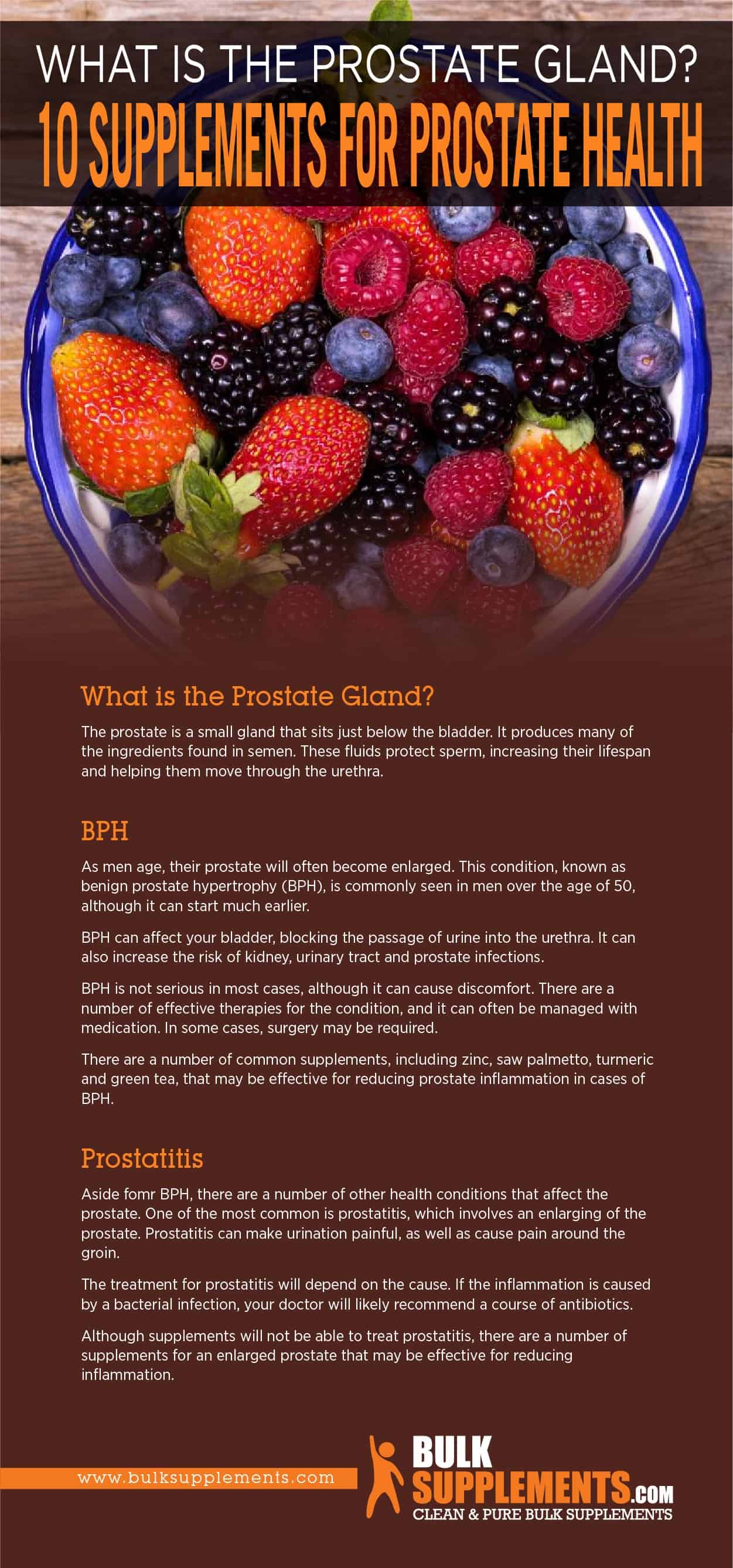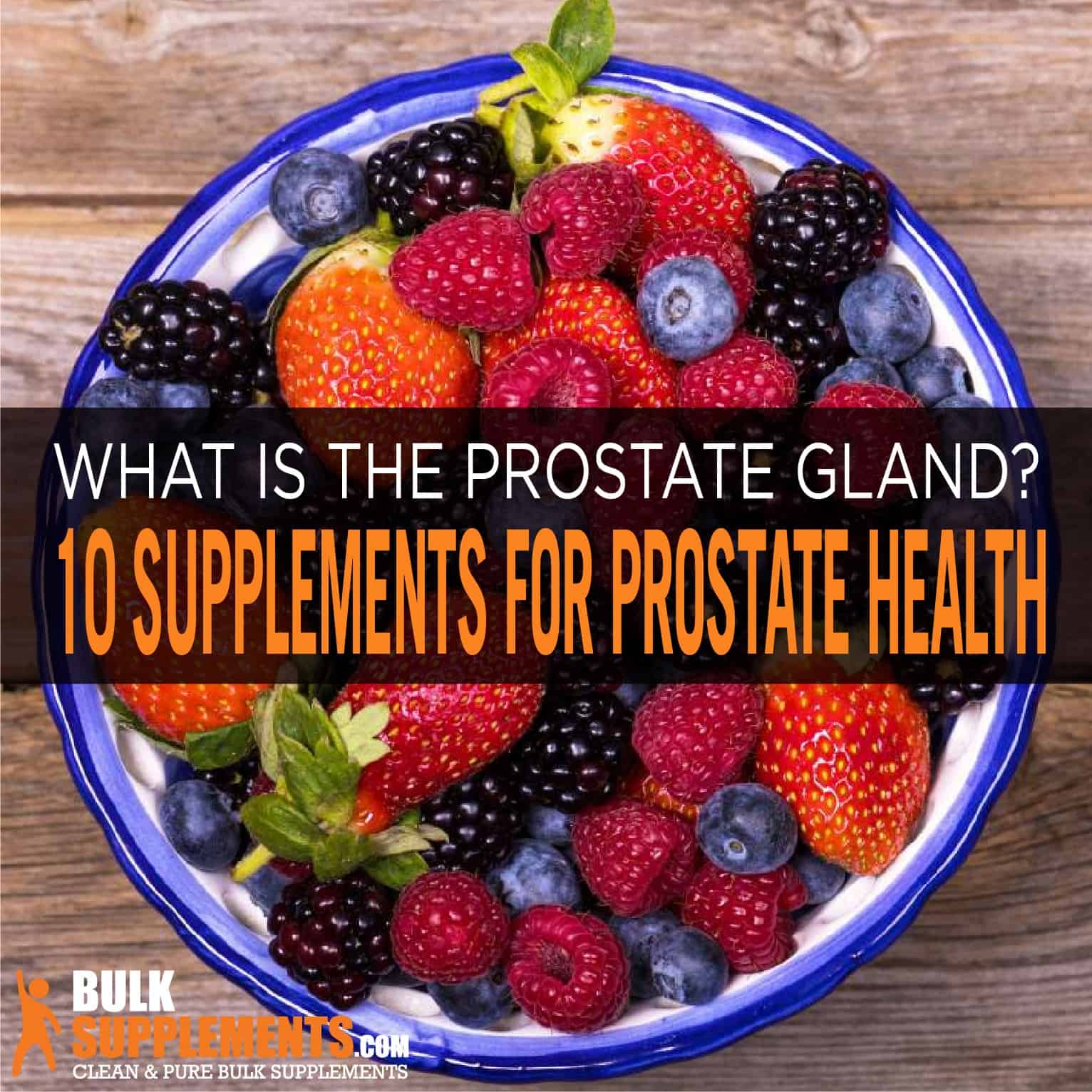Updated: 12/5/23
Are you looking for ways to improve your prostate health? Supplements can be an effective tool in managing and protecting against prostate issues. Understanding the right ones to take, and how they work, is essential. Whether you’re levering supplements as preventative care or are seeking a direct solution to an existing issue, this guide provides 10 supplements that have been shown to support prostate health. Improve your overall quality of life today with safe and convenient supplementation!
What is the Prostate Gland?
The prostate gland is a walnut-sized gland located between the bladder and the penis. Its main function is to produce a fluid that accompanies sperm during ejaculation. The gland surrounds part of the urethra, the tube that carries urine from the bladder out of the body. As a result, the prostate gland is also responsible for regulating the flow of urine out of the body. While the prostate gland is essential for reproductive function, it can sometimes cause problems as men get older. For example, an enlarged prostate can lead to urinary problems such as difficulty urinating, frequent urination, and urinary tract infections.
The primary function of the prostate gland is to produce semen. It does this by secreting a fluid that helps sperm move and survive in the vaginal environment. Additionally, the prostate gland also plays a role in regulating urine flow. The gland surrounds the urethra (the tube that carries urine out of the body), and when it grows, it can put pressure on the bladder, leading to urinary problems.
What is BPH?
Benign prostatic hyperplasia, or BPH, is the condition of an enlarged prostate gland. The prostate is a small gland located below the bladder in men, and it envelops the urethra, which carries urine from the bladder out of the body. As men age, their prostate gland grows larger, which can cause problems in urinary functions. While BPH is not cancerous, it can cause discomfort and worry for those who suffer from it.
The most common symptoms of BPH include difficulty urinating, frequent urination, weak urine flow, and the need to urinate urgently, especially at night. These symptoms can impact your quality of life, interfering with sleep, work, and social activities. If untreated, BPH can lead to more serious conditions such as urinary tract infections, bladder damage, or kidney failure.
The good news is that many effective treatments are available for BPH, ranging from medications to surgery. Medications such as alpha-blockers and 5-alpha-reductase inhibitors can help relax the prostate and reduce its size, improving urine flow and reducing night-time urination. Minimally invasive procedures like laser therapy and transurethral microwave thermotherapy can help destroy the excess prostate tissue, leading to better urinary flow. In more severe cases, surgical procedures for BPH like prostatectomy or transurethral resection may be necessary.
What is Prostatitis?
Prostatitis is a condition that affects men, especially those in their 30s to 50s. It is a common condition that causes the prostate gland to become inflamed, leading to symptoms such as urinary tract infections, painful ejaculation, and lower back pain. Although prostatitis can be a painful condition, it is treatable. In this blog post, we will delve deeper into what prostatitis is and how to manage it.
There are four types of prostatitis, and it is essential to know which one you have to get the right treatment. Acute bacterial prostatitis is a severe form of the condition that requires urgent medical attention. Chronic bacterial prostatitis is a persistent infection that may require long-term antibiotic treatment. Chronic prostatitis without bacteria is prevalent and may require a combination of medical treatments. Asymptomatic inflammatory prostatitis is the least common type and can cause inflammation without any symptoms.
The symptoms of prostatitis can vary, and it is crucial to identify them early to seek treatment. Common symptoms include pain or discomfort in the groin, difficulty urinating or weak flow, frequent urination, and fever or chills. Other symptoms may include pain or discomfort during ejaculation, blood in semen, and lower back pain. It is important to note that some men with prostatitis may not experience any symptoms.
In addition to medical treatments, there are several home remedies that men can use to manage prostatitis symptoms. These include using warm sitz baths, drinking cranberry juice, taking zinc supplements, and avoiding caffeine and alcohol. Other home remedies include getting regular exercise, avoiding prolonged sitting, and practicing stress management techniques. Although supplements will not be able to treat prostatitis, there are a number of supplements for an enlarged prostate that may be effective for reducing inflammation.

Prostate Supplements for Prostate Health
There are various herbs and vitamins for the prostate that could protect the gland and reduce inflammation. Here are some of the most effective:
Saw Palmetto
Saw palmetto is a popular supplement for prostate health. It may also reduce the severity of urinary symptoms seen with BPH, cutting down the number of times you’ll have to visit the bathroom.
Most studies have in use a saw palmetto dose of around 320 mg of saw palmetto, divided in two. There are few common side effects, and those that are mild. Some users experience stomach pain, nausea and constipation while taking the supplement
Beta-sitosterol
Beta-sitosterol is a plant-based compound that is found in many foods and supplements. It shows to be effective in reducing symptoms of an enlarged prostate, such as frequent urination and weak urine stream. Beta-sitosterol can be in supplement form from our website.
Pygeum
Pygeum comes from the bark of the African plum tree and has been used for centuries to treat prostate problems. It shows to reduce inflammation in the prostate gland and to improve urinary function. Pygeum can be online on our website.
Zinc
Zinc is an essential mineral that plays a crucial role in maintaining the health of the prostate gland. It helps to regulate the production of male hormones and to reduce inflammation in the gland. Zinc is crucial for proper prostate function. The prostate absorbs over 10 times as much zinc as other types of tissue.
Selenium
Selenium is another essential mineral that helps to support the health of the prostate gland. It shows to reduce the risk of developing prostate cancer and to improve urinary function.
Stinging Nettle
Stinging nettle is a plant that is rich in nutrients that can help maintain prostate health. It shows to help reduce inflammation in the gland and to improve urinary function. Stinging Nettle root can be found on our website.
Green Tea
Green tea is a powerful antioxidant that has been shown to be effective in reducing the risk of developing prostate cancer. It can fight inflammation, reducing the size of the prostate and preventing urinary symptoms. It also helps to reduce inflammation in the gland and to improve urinary function. Green tea extract capsules can be for purchase on our website.
Vitamin D
Vitamin D is an essential nutrient that plays a crucial role in maintaining the health of the prostate gland. It shows to reduce the risk of developing prostate cancer and to improve urinary function. Vitamin D supplement can be on our website for purchase.
Curcumin
Curcumin is a compound found in turmeric that has powerful anti-inflammatory properties. It shows to reduce inflammation in the prostate gland and to improve urinary function. It may also be able to help those with an inflamed prostate, which reduces the severity of urinary symptoms, although more studies are needed to see if these results are also seen in humans.
Doses for turmeric vary depending on the concentration of curcuminoids. In general, you should aim for around ½ teaspoon of turmeric powder per day, as anything more increases the risk of side effects.
Turmeric for the prostate generally considered safe, with few adverse reactions when taken within the recommended dose range. Some users report mild stomach pain, while others report irritation and swelling if turmeric contacts their skin.
Lycopene
Lycopene is a powerful antioxidant that is found in many fruits and vegetables, including tomatoes. It shows to be effective in reducing the risk of developing prostate cancer and to improve urinary function. It showsto have antioxidant effects, reducing the damage of free radicals on cells.
Studies have used doses of lycopene ranging from 5 to 15 mg. For general prostate health, a dose of around 6 mg should be sufficient.
Lycopene is well tolerated by most people, although some users report mild gastrointestinal discomfort.
The Bottom Line
The prostate is an important gland for healthy male function. It produces many of the fluids that protect sperm, so proper prostate function needs for reproduction.
As men age, their prostate often becomes enlarged. This condition, called benign prostate hypertrophy (BPH) can cause urinary pain and discomfort. Although not serious in most cases, it can get worse over time if not treated.
Maintaining prostate health is important for men of all ages. Incorporating prostate supplements into your daily routine can help reduce the risk of developing prostate problems and improve urinary function. The 10 supplements listed above are all effective in maintaining the health of the prostate gland and reducing the risk of developing prostate cancer. Consult with your physician to determine which supplement is right for you.
These statements have not been evaluated by the Food and Drug Administration. These products are not intended to diagnose, treat, cure or prevent any disease.


